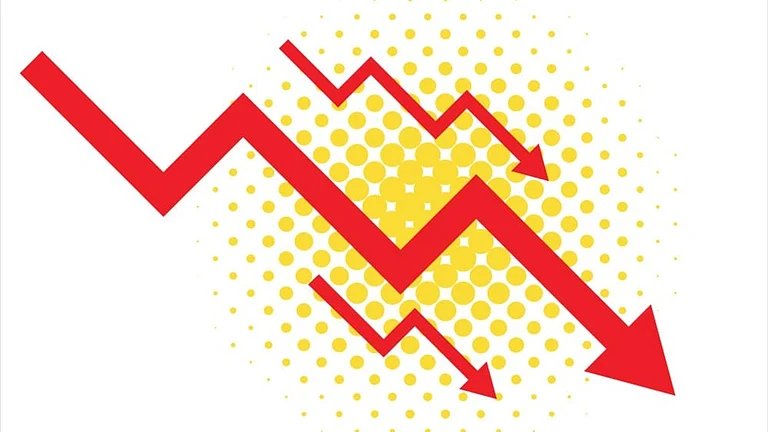Domestic equity markets opened lower for the fourth consecutive session before closing with minor gains on Monday, as weaker-than-expected US jobs data raised concerns about a slowing US economy, sending stocks lower globally.
While a 25 basis points rate cut is anticipated, the market is concerned whether such a rate cut will be insufficient. Additionally, investors worry that a rate cut as large as 50 basis points may signal a recession in the world’s largest economy.
The BSE Sensex fell 169.57 points or 0.21 percent to 81,014.36, and the NSE Nifty50 fell 54 points or 0.22 percent to 24,798.15. The index was down for the fourth consecutive session.
However, the markets bounced back from early lows, snapping their four-day losing streak following a rally in index heavyweights like ICICI Bank, Hindustan Unilever and HDFC Bank. The benchmark indices both edged upwards despite mixed market sentiment. Market breadth remained negative, with more stocks declining than advancing. The Sensex rebounded 375.61 points or 0.46 percent to settle at 81,559.54. The Nifty 50 went up by 84.25 points or 0.34 percent to finish at 24,936.40.
Vinod Nair, head of research at Geojit Financial Services, says that despite a negative opening amidst weak global cues, the domestic market exhibited some recovery from last week’s steep fall. The market is currently attempting to gain stability between potential rate cuts and recession fears in the US.
"The current trend in US job data suggests that the anticipated 25bps rate cut may not be sufficient. Moreover, the upcoming data on US inflation and jobless claims will be decisive in assessing the market trend,” he added.
Prashanth Tapse, senior VP (research) at Mehta Equities, says the stock markets have taken a sharp bearish turn, with sentiment shifting from optimism about cooling US inflation to concerns over a potential US economic slowdown. Friday's weaker-than-expected jobs data has reignited fears of a recession, further compounded by soft manufacturing updates. “As global cues remain sluggish, Nifty is expected to trade cautiously ahead of key US inflation reports on September 11 and 12, and the Fed's decision on September 18. FIIs turned net sellers, and India VIX surged to 15.21 levels, signaling heightened market fear,” Tapse said.
How the global markets are Faring?
Other Asian markets, including Seoul, Tokyo, Shanghai and Hong Kong, settled lower on Monday following the rout in US markets. Japan’s benchmark Nikkei 225 index was hovering around its lowest level in almost a month during the morning session and settled 0.5 percent down at 36,215.75. According to revised data from the Cabinet Office released on Monday, Japan’s gross domestic product grew by an annualised 2.9 percent in the second quarter.
Stocks in Chinese markets also witnessed losses after worse-than-expected inflation data disappointed investors. Data from the National Bureau of Statistics on Monday showed that deflationary pressure continues to loom large, as the consumer price index grew by 0.6 percent year-on-year in August, while the producer price index, which measures costs for manufacturing, was down 1.8 percent compared to August last year.
Hong Kong's Hang Seng index declined 2.2 percent to 17,068.34, and the Shanghai Composite index was down 1.2 percent at 2,731.70. Among other major global markets, Australia's S&P/ASX 200 dipped 0.3 percent to 7,988.10. South Korea's Kospi lost 0.4 percent to 2,534.11.
On Friday, the S&P 500 dropped 1.7 percent and ended at 5,408.42 to close out its worst week since March 2023. Tech stocks drove the market lower amid ongoing concerns that their prices soared too high in the boom around artificial intelligence, and they dragged the Nasdaq composite down by a market-leading 2.6 percent to 16,690.83. The Dow Jones Industrial Average dropped 1 percent to 40,345.41.
After the jobs report showed US employers hired fewer workers in August than economists expected and it showed a second-straight month where hiring came in below forecasts. It also followed recent reports showing weakness in manufacturing and other areas in the economy.
V K Vijayakumar, chief investment strategist at Geojit Financial Services, says the market is likely to turn volatile in the coming days as indicated by the spurt in CBOE VIX by 12 percent to 23.50. Two factors are likely to weigh on markets: one, the outcome of the US presidential elections and two, the Fed’s decision on the rate cut.
“The presidential election is tight now and can go both ways. The market will be concerned about a possible Trump victory and its consequences on policy, particularly on trade tariffs, which markets fear can trigger a trade war,” Vijayakumar said.
“A 25bps cut may be inadequate in the context of the slowing economy and a 50bps cut may confirm recession fears. This dilemma has to be resolved by the Fed chief Powell in his message,” he added.
According to exchange data, foreign institutional investors (FIIs) offloaded equities worth Rs 620.95 crore on Friday.
Sameet Chavan, head research, technical and derivative at Angel One, says September is typically a month prone to profit-taking, and this pattern appears to be resurfacing as the first week began with a correction. The exhausted Bulls succumbed to the global turmoil on the last session of the trading week, forming a ‘Bearish Engulfing’ pattern on the weekly time chart for the benchmark index.
According to Chavan, looking ahead, the release of US employment data over the weekend and its potential impact on global markets will likely shape near-term trends. Consequently, it could also set the tone for domestic markets. “It is advisable to maintain caution and avoid aggressive trades for the time being,” Chavan said.
Global equity markets remain volatile amid economic uncertainties and mixed data. While domestic markets showed some recovery after recent declines, concerns about the adequacy of potential US rate cuts and recession fears persist. Investors should stay cautious as they await key US inflation and jobless claims data, along with the Fed's decision on interest rates, which will likely shape future market trends.
































